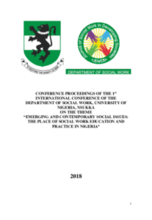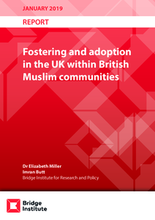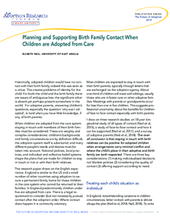Displaying 221 - 230 of 661
This chapter identifies the structural components of the transnational illegal adoption market by applying the basic logic of the routine activity theory that has been developed by Cohen and Felson.
This special section of the journal of Research on Social Work Practice focuses on adoption breakdown.
The current study compared behavioral and adrenocortical functioning of maltreated and comparably aged (1.5–3 years) institutionally-reared children soon after (1.5–2.5 months) placement in foster care or adoptive homes, respectively.
The aim of this article is to analyse the specific factors which influence adoption breakdown by comparing cases of adoption breakdown which occurred prior to the onset of adolescence with those occurring after the beginning of this developmental stage.
To inform decisions about permanent care arrangements, the authors of this study used Swedish national population registers to create a sibling population consisting of 194 children born 1973–1982 who had been in out-of-home care (OHC) at least 5 years before adolescence but were never adopted (50% boys) and their 177 maternal birth siblings who also had been in OHC at least 5 years before their teens but were adopted before adolescence (52.5% boys).
The First International Conference of the Department of Social Work, University of Nigeria, Nsukka, with the theme “Emerging and Contemporary Social Issues: The place of Social Work Education and Practice in Nigeria” was held 10-13 September 2018 and included 96 oral presentations of papers by delegates from across the country. Several papers focused on illegal adoptions of children in Nigeria and the role of social workers in addressing this practice.
This report examines the challenging relationship between Islam and fostering and adoption in the UK, and efforts currently being made to address it.
This open access article explores three related phenomena: first, the abandonment and institutionalization of children with disabilities in China that increased disproportionately in the 2000s; second, the important relationships between such abandonments, culture, economics, and politics in contemporary China; and third, the relationship between such abandonments, the increasing rates at which Chinese orphans with disabilities are being adopted to Western countries through Inter-country Adoption (ICA), and the global politics of ICA and disability.
When children are adopted from the care system staying in touch with members of their birth families must be considered.This research paper draws on the English experience.
The aim of this article is to develop proposals for the organization of a legal and regulatory framework in Russia, in accordance with the social and psychological needs of guardianship families and to identify the possibilities of the Ombudsman for the Rights of the Child to protect the rights of minors raised in guardianship families.



